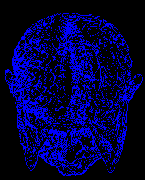1.00 The simplest thing any Group
of
identifying [br]Others can say
of themselves that is if they
can speak is either
"We
are it" or
"We are not it"
& "We have it"
or "We don't"
1.01 These most primitive statements
when combined within the body
politic of some particular Group
of
identifying [br]Others
constitutes 4 fundamental
states
of existence
1.02 These 4 states can
be designated as follows
1. The state of the atmus! in which
subjects consider themselves
"to be
it but not to have it"
2. The state of the givat! in which
subjects consider themselves
" not to be it but to have
it"
3. The state of the givatmus! in which
subjects consider themselves
" to
be it and to have it"
4. The state of the anatmus! in which
subjects consider themselves
" not to be it and not to have it"
2.00 All known Groups of identifying
[br]Others are constituted historically in
the midst of Social Orders economically
"red in tooth and claw" and subject
to the demand for the recognition of
their right to exist
within any such
Order despite the unfreundly
ways of all neighbouring
rivaling Others
2.01 An 8-fold typology
of such Groups of identifying
[br]Others is generated when
the
presence or absence of
this demand for recognition
is combined with the
the above 4
states
3.00 For all specific Groups
of identifying [br]Others their
"trumu Group Sociogram"
can be defined as that which
represents one of these eight
fundamental states
3.01 From a Historical point
of view there are two types
of trumu Sociogram: d-ones
that draw Others
towards
them and b-ones that
Others blow away
3.02 These eight
trumu Sociograms
represent the following
states of existence
(0) The b-Anatmus! state
Don't look at us
We are not it and
We don't have it
(1) The d-Anatmus! state
Look at us
We are not it and
We don't have it
(2) The b-Atmus! state
Don't look at us
We are it but
We don't have it
(3) The d-Atmus! state
Look at us
We are it but
We don't have it
(4) The b-Givat! state
Don't look at us
We are not it but
We have it
(5) The d-Givat! state
Look at us
We are not it but
We have it
(6) The b-Givatmus! state
Don't look at us
We are it and
We have it
(7) The d-Givatmus! state
Look at us
We are it and
We have it
4.00 All eight states
will be
reflected within the fragments
of the Historical records of any
such
literate Groups and each
will fall quite naturally
on either
side of the categorical split that
differentiates Major from Minor
groups of identifying [br]Others
4.01 Within any particular present
day Group a single example of one
of these states of existence can
be exhibited through the
response
of an individual
member subject
to the following
two questions
1. As regards Other
Groups what
sort of
"Group" is yours?
A "Look
at them"
or
"Don't
look at them"
2. And as regards
specific Other Groups
what sort of "Group" is yours?
"They
are it" or "They
are not it"
"They
have it" or "They
don't have it"
4.02 In answering the first
the member has the option
of either assuming the
"d" or "b" position
4.03 In answering the second
the member has the option
of regarding Other
groups
as either being or not being it
before their having or not
having it or vice
versa.
From a theoretical point
of view though the order
chosen is basically
a
reflection of an individual
member's own personal
history as regards Others
and bears no significance
as regards the history
of the individual Group
4.04 Actual membership
of
any individual Group is
conferred either by
origin of
birth or by elective selection by
some band of favouring [br]Others
in the context of one's own
other [br]Other embracing self
4.05 A
consequence of these
differing origins is that Groups
determined solely by birth
such as Family, Race and Tribe
remain
totally exclusive and
closed whilst those determined
by elective selection
by self or
Other such
as Religion, Class
and Nation are potentially totally
open and inclusive of all Others
as a result of their conquering
and converting ways
5.00 It ought never to be
forgotten though that the
simplest
thing any Group
of identifying [br]Others
can say of themselves that
is if they are able to speak
is either "Look
at us"
or "Don't
look at us"
"We
are it"or "We
are not it"
and "We
have it" or
"We
don't have it"
5.01 From the point of view
of logic all
such problematic
positions whether they be
"them" or "us" orientated
mirror each Other perfectly
in inverted forms

5.02 Indeed it is this set
of mirroring problematic states
that constitutes that Order the
one of Phallocentric Groups
that remains central to
the structuring
of all known
Groups of
identifying [br]Otherss

